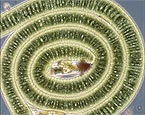The 10-year Census of Marine Life has discovered huge numbers of previously unknown microbes, zooplankton, crustaceans, worms, and other small species, astonishing scientists with the sheer number of life forms that make up the lower orders of the marine food chain. Scientists estimate that as many as a billion different marine microbe species may exist, forming a biomass so vast that its weight equals that of 240 billion African elephants. Among the major discoveries of the census was the existence of large, whitish mats on the sea floor formed by multi-cellular bacteria that resemble thin strands of spaghetti. One such mat — roughly the size of Greece — was found in oxygen-starved Pacific waters off the coasts of Chile and Peru. “In no other realm of sea life has the magnitude of Census discovery been as extensive as in the world of microbes,” said Mitch Sogin, a scientist from the Marine Biological Laboratory in Woods Hole, Mass. who heads the marine microbe census.
Countless Microbe Species Discovered in Census of Marine Life
More From E360
-
WATER
After Ruining a Treasured Water Resource, Iran Is Drying Up
-
FILM
At a Marine Field Station, Rising Seas Force an Inevitable Retreat
-
Energy
To Feed Data Centers, Pennsylvania Faces a New Fracking Surge
-
SPACE
Scientists Warn of Emissions Risks from the Surge in Satellites
-
WILDLIFE
A Troubling Rise in the Grisly Trade of a Spectacular African Bird
-
MINING
In Myanmar, Illicit Rare Earth Mining Is Taking a Heavy Toll
-
INTERVIEW
How Batteries, Not Natural Gas, Can Power the Data Center Boom
-
ANALYSIS
As U.S. and E.U. Retreat on Climate, China Takes the Leadership Role
-
Solutions
From Ruins to Reuse: How Ukrainians Are Repurposing War Waste
-
ANALYSIS
Carbon Offsets Are Failing. Can a New Plan Save the Rainforests?
-
Energy
Facing a Hostile Administration, U.S. Offshore Wind Is in Retreat
-
Biodiversity
As Jaguars Recover, Will the Border Wall Block Their U.S. Return?
